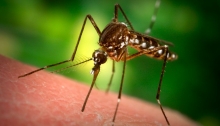The year was 1982. "Food for Thought", a new and innovative course conceived by Drs. David Harpp, Joe Schwarcz & Ariel Fenster. Designed to provoke some thought, separate fact from fiction and of course, digest everything there is to know about food. And now, 17,000 students later, you too can take this course. FOR FREE. That's right. McGill presents its very-first MOOC (massive open online course), & the McGill Office for Science and Society (OSS) is up at bat. Are you ready for some Food for Thought?

Information is the key to life. We want to know what to eat, how to protect our environment, what risks to avoid and what to do if illness strikes. But when it comes to acquiring information, it is the best of times and the worst of times. It is the age of wisdom, it is the age of foolishness. Newspapers, television, radio and of course the Internet bombard us with information at an unprecedented rate, but when it comes to scientific issues the quality of the information is variable.
The Redpath Museum now offers videoconferences to school groups of any grade or age level. Visit the Museum without having to take a field trip!
Choose from three presentations: Meet the Triceratops, Egyptian Life, or Quebec Biodiversity.
The sessions are streamed live, last one hour, and feature a museum educator in the Redpath Museum galleries.

Almost 40,000 people in the United States developed West Nile virus last year and 1,549 died because of it. Compare that to 1999, the first year the disease was seen in North America, when only 62 people were reported infected.

Selected lectures from Mini-Science 2013: Science, Sex, and Gender are now available as webcasts and podcasts. Listen or watch, when you want, where you want, at no charge!

Got an itch for knowledge? From July 11 to December 15, 2013, the Canal Savoir network will be broadcasting features from several series, including the Cutting Edge Lectures in Science; Mini-Science; the Women in Science, Engineering and Medicine Symposium; and more. Refer to the schedule to find out when to tune in, and to find out more about each episode.
Canal Savoir is a non-profit, Quebec-based television network that strives to make higher learning accessible to everyone.
Edmonton—Graduate students in the Faculty of Engineering will have the opportunity to get the inside track on communicating with non-technical audiences and tech commercialization during the Faculty of Engineering Graduate Research Symposium.
Keynote speakers Joe Schwarcz and Peter Hackett will share their experiences and expertise with symposium attendees and volunteers.

Priority is to enhance science teaching and outreach
By Neale McDevitt
David Harpp officially began his tenure as Tomlinson Chair in University Science Teaching on February 1. But as anyone who knows the long-standing chemistry prof will tell you, he’s been preparing for this his whole professional life. “It’s a pretty good fit,” said Harpp from his Otto Maas office, smiling the smile of a man who thoroughly enjoys understatement.
Talented McGill student wins international acclaim and attention for trail-blazing research.
Talented McGill student rolls up sleeves to help save the environment.
Talented McGill student uses downtime to help people in need.
All three of these storylines have been seen on these pages more than once, but this time, they all have to do with the same person; U0 Science undergrad, Miranda Wang.
The level of oxygen in the St. Lawrence estuary has fallen significantly in recent decades. The causes and long-term effects of this phenomenon are poorly understood and worry researchers. ... The affected underwater region is located near Tadoussac and off Rimouski. The oxygen that marine life depends upon has fallen by roughly half since the 1930s, according to Alfonso Mucci, a professor in the Department of Earth and Planetary Sciences at McGill University. ...
Over 60 years ago, McGill Professors Yves Clermont and Charles Leblond published a paper that revolutionized our understanding of cell biology. Their stem cell renewal theory marks the first use of the term "stem cells" in this biological context.
Read more about these pioneering scientists and their contributions on the website of the Department of Anatomy and Cell Biology.

How safe is your shampoo, sofa or shirt? Campaign will soon launch efforts to get ten major U.S. retailers to phase out potentially "toxic" products. Dr. Joe Schwarcz comments on when "toxic" really "toxic."

Dr. Harriet Hall, also known as the SkepDoc, reviews Dr. Joe Schwarcz' latest book, "The Right Chemistry," and concludes that both him and his book do it just right.
To read the review, please click here.

Always engaged in educating the public about science, Dr. Joe Schwarcz discusses the importance of skepticism in science.
Click here to see Chemistry is not a four-letter word, Dr. Joe Schwarcz' TEDx lecture from last year's Montreal TEDx event.

By Jane Brody, The New York Times
Let’s start the new year on scientifically sound footing by addressing some nutritional falsehoods that circulate widely in cyberspace, locker rooms, supermarkets and health food stores. As a result, millions of people are squandering hard-earned dollars on questionable, even hazardous foods and supplements.
